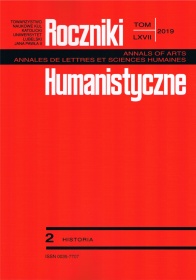Geographical Descriptions of Spain in Latin Medieval Encyclopaedias: From Isidore of Seville to Vincent of Beauvais (VII-XIII c.)
Abstract
The article discusses the problem of reception of the description of Spain contained in the Etymologies by Isidore of Seville in Latin medieval encyclopaedias, on the background of the development of the medieval encyclopaedic trend. The etymological-geographical description of his homeland was placed by Isidore in book 14 of his work (14, 4, 28-30). This portrayal was “supplemented” in other places in the Etymologies, among other things, with an etymological-ethnographical aspect (9, 2, 109-114). When presenting Spain, Isidore based his work on works from the Antiquity. He showed mainly a Roman Spain, with few references to the contemporary situation of the country under Gothic rule. In later encyclopaedias, in which geographical sections are present, Isidore’s description of Spain is used to a varied extent. It was either repeated (Raban Maur, Vincent of Beauvais), and shortened, with minor modifications (Honorius Augustodunensis), or combined with information found in, for example, the work of Orosius (Historiae: Historiarum adversum paganos libri VII). In the latter case, the combined whole was still updated (with certain selected facts concerning contemporary Spain). Such descriptions were placed in the works of Gervase of Tilbury and Bartholomeus Anglicus. It should be noted that Gervase of Tilbury added to the presentation of Spain a fragment illustrating its division into archbishoprics and bishoprics. A comparison of medieval encyclopaedic descriptions of Spain written before the middle of the XIIIth century – that is, before the encyclopaedia Speculum maius was compiled, it can be claimed that each of them drew on the description placed in book 14 of the Etymologies; in Speculum maius, the greatest encyclopaedia of the Middle Ages, in its part entitled Speculum historiale, this description was repeated word for word, as mentioned above. It may said, that despite new descriptions of Spain (formulated in the first half of the XIIIth c. by Gervase of Tilbury and Bartholomeus Anglicus), the portrayal drawn by Isidore of Seville maintained its “validity”, as it were. Taking into account the outstanding role of medieval encyclopaedic works in the dissemination of knowledge in this epoch, it may also be claimed that the Spain of that time was perceived (at least till the middle of the XIIIth century) “through the eyes of Isidore” (this fact has its reflection in the cartography of the time). It remains to be seen how this picture changed (and if it changed for good) in the late Middle Ages.
References
Cazier P., Isidore de Séville et la naissance de l’Espagne catholique, Paris: Beauchesne 1994 (Theologie historique, 96).
Collison R., Encyclopaedias: their history throughout the ages, New York–London: Hafner Publishing Co. 1964.
Ingelbert H., Interpretatio christiana. Les mutations des savoirs (cosmographie, géographie, etnographie, histoire) dans l’Antiquité chretienne, 30-630 après J.-C., Paris: Institut d’Etudes Augusti-niennes 2001 (Collection des Études Augustiniennes. Série Antiquité, 166).
Kochanek P., Die Vorstellung von Norden und der Eurozentrizmus. Eine Auswertung der patristischen und mittelalterlichen Literatur, Mainz: von Zabern 2004 (Veröffentlichungen des Instituts für Abendländische Religions-geschichte, 205).
König J., Woolf G. (eds.), Encyclopaedism from Antiquity to the Renaissance, Cambridge: Cambridge University Press 2013.
Palmier-Foucart M., Duchesne M.-C., Vincent de Beauvais et le Grand Miroir du monde, Turnhout: Brepols 2004.
Philipp H., Die historisch-geographischen Quellen in den etymolgiae des Isidorus von Sevilla, Teil 2.Textaugabe und Quellenangabe, Berlin 1913 (Quellen und Forschungen zur alten Geschichte und Geographie, Heft 26).
Strzelczyk J., Gervazy z Tilbury. Studium z dziejów uczoności geograficznej w średniowieczu [Gervase of Tilbury. A study in the history of geographic learnedness in the Middle Ages], Wrocław–Warszawa–Kraków: Zakład Narodowy im. Ossolińskich 1970 (Monografie z Dziejów Nauki i Techniki [Monographs in the History of Science and Technology], 66).
Ribémont B., De natura rerum. Études sur les encyclopédies médiévales, Orléans: Paradigme 1995.
Ribémont B., Les origines des encyclopédies médiévales. D’Isidore de Séville aux Carolingiens, Paris: Honoré Champion 2001 (Nouvelle Bibliothèque du Moyen Âge, 61).
Ribémont B., La “Renaissance” du XIIe siècle et l’encyclopédisme, Paris: Honoré Champion 2002 (Essais sur le Moyen Âge, 27).
Copyright (c) 2019 Roczniki Humanistyczne

This work is licensed under a Creative Commons Attribution-NonCommercial-NoDerivatives 4.0 International License.





